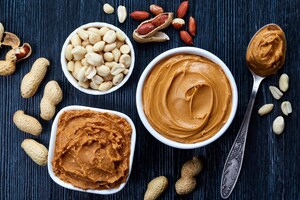
ALBANY, Ga., Nov. 10, 2020 /PRNewswire/ -- In the past three years, new research has found that peanuts and peanut butter can be a powerful tool to help diabetics live a healthier life and prevent the onset of type 2 diabetes in others, according to The Peanut Institute.
A recent study conducted by Penn State and published this June in Current Developments in Nutrition found that those with elevated fasting blood sugar who ate a single serving of peanuts (about 1 oz.) as an evening snack had improved blood sugar levels in the morning.1
"Peanuts have a low glycemic index of 14, which helps to prevent spikes in blood sugar, which in turn reduces insulin needs," says Dr. Samara Sterling, a nutrition scientist and research director for The Peanut Institute. "This new research shows that peanuts can help keep blood sugar stabilized overnight, which is something many diabetics struggle with."
In 2019, the Journal of American Nutrition published research that showed when peanut butter was added to a high glycemic index meal the spike in blood glucose was significantly lower than without the peanut butter. The study authors explained that this effect may be due, in part, to the high protein and healthy fat content of peanut butter.2
In fact, peanuts pack more protein than any other nut.3 A single serving of approximately 35 peanuts delivers seven grams of plant-based protein along with fiber and healthy fats. A single serving of peanut butter is two tablespoons.
There's also encouraging news for women who like peanut butter. A landmark study published in 2018 in JAMA (Journal of the American Medical Association) found that women who consumed peanut butter five times a week had a 21% reduced risk of developing type 2 diabetes.4
"Peanuts are a superfood and illustrate the concept of food as medicine," says Sterling. "When you eat peanuts and peanut butter, you're ingesting three macronutrients -- protein, fiber and healthy monounsaturated and polyunsaturated fats. You're also getting 19 micronutrients, including niacin, vitamin E and manganese. Regularly choosing foods that contribute to your overall health is a positive action that can deliver life-long benefits."
A 2014 study published in the Journal of Nutrition showed that peanuts contribute to overall health. It found that daily consumption of peanuts enriched the American Diabetes Association meal plan and improved blood lipids as well as the levels of vitamin E, niacin and magnesium in participants.5
For additional research findings, visit peanutinstitute.com. For breakfast, lunch, dinner and snack recipes, visit peanutinstitute.com/recipes.
Based in Albany, Ga.,The Peanut Institute is a non-profit organization supporting nutrition research and developing educational programs to encourage healthful lifestyles that include peanuts and peanut products. The Peanut Institute pursues its mission through research programs, educational initiatives and the promotion of healthful lifestyles to consumers of all ages. As an independent forum, The Peanut Institute is uniquely positioned to work with all segments of the food industry, the research community, academia, consumer organizations and governmental institutions.
Sources:
1. Philip Sapp, Kristina Petersen, Penny Kris-Etherton, Fasting Glucose Response to Evening Snacks That Differ by Carbohydrate and Fat Composition: A 6-Week, Randomized, Crossover Trial in Subjects with Impaired Fasting Glucose, Current Developments in Nutrition, Volume 4, Issue Supplement_2, June 2020, Page 1143, https://doi.org/10.1093/cdn/nzaa055_028
2. Lilly, L.N., et al., The Effect of Added Peanut Butter on the Glycemic Response to a High–Glycemic Index Meal: A Pilot Study. Journal of the American College of Nutrition, 2019. 38(4): p. 351-357.
3. U.S. Department of Agriculture, Agricultural Research Service. 2013, USDA National Nutrient Database for Standard Reference, Release 26. Nutrient Data Laboratory Home Page, http://www.ars.usda.gov/ba/bhnrc/ndl.
4. Jiang R, Manson JE, Stampfer MJ, Liu S, Willett WC, Hu FB. Nut and Peanut Butter Consumption and Risk of Type 2 Diabetes in Women. JAMA. 2002;288(20):2554–2560. doi:10.1001/jama.288.20.2554
5. Wien, M., K. Oda, and J. Sabaté, A randomized controlled trial to evaluate the effect of incorporating peanuts into an American Diabetes Association meal plan on the nutrient profile of the total diet and cardiometabolic parameters of adults with type 2 diabetes. Nutrition journal, 2014. 13: p. 10-10.
SOURCE The Peanut Institute








Share this article